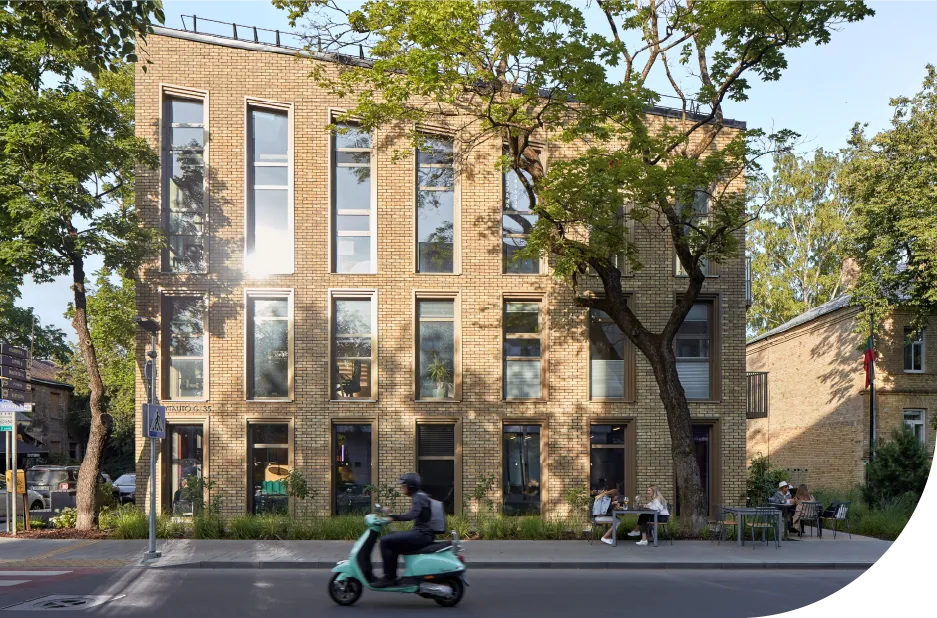© A. Aleksandravičius
When considering a move to Lithuania, it’s important to understand the cost of living. Compared to Western European countries, Lithuanian cost of living is generally lower. However, there are differences depending on the city you choose to live in. For example, living costs in Vilnius, the capital, are higher than in smaller cities like Klaipėda or Šiauliai.
On average, a person needs between €700 and €1,200 per month to cover essential expenses, including housing, utilities, food, and transportation. While it may be more expensive in urban centers, the cost of living in Lithuania remains affordable for most expats and locals alike.
Is it expensive to live in Lithuania? The answer depends on your lifestyle. While basic costs are lower than in Western Europe, luxury goods and services may be on par with or even higher than in other EU nations.
Living Expenses in Lithuania: Monthly Costs
Breaking down the cost of living in Lithuania per month offers a clearer picture of the major expenses you should expect. Housing is often the biggest expense, especially in Vilnius. In the capital, a one-bedroom apartment in the city center may cost around €500 to €800 per month, whereas in smaller cities, you might find similar apartments for as low as €300 to €500.
Utilities (including electricity, heating, and internet) generally add another €100 to €150 per month. Groceries are relatively inexpensive, with most households spending around €200 to €400 on food monthly.
For living costs in Vilnius, expect to pay slightly more than the national average. In contrast, the average cost of living in Lithuania outside major urban centers is noticeably lower, making it a more attractive option for those seeking affordability.
Food Prices and Culture in Lithuania
Lithuania’s food culture is deeply rooted in tradition, with hearty dishes like cepelinai (potato dumplings) and šaltibarščiai (cold beet soup) being popular across the country. Dining out is affordable compared to Western European standards, with a typical meal at a mid-range restaurant costing about €10 to €15 per person.
In terms of food prices in Lithuania, groceries are reasonably priced. For instance, a liter of milk costs around €1, while a loaf of bread is priced at approximately €1.20. Lithuania food prices for meat, fruits, and vegetables are also affordable, though imported goods may be more expensive. Overall, living expenses in Lithuania related to food are manageable for most budgets.
Housing and Rent Prices in Lithuania

© N. Tukaj
The Lithuanian housing market has seen growth in recent years, with a mix of old Soviet-style apartments and modern developments catering to different income levels. Lithuania house prices vary based on location and property type. In Vilnius, buying an apartment in the city center costs around €2,500 to €3,500 per square meter, while outside the capital, prices can drop to €1,200 to €1,800 per square meter.
Rent costs in Lithuania are also affected by location. As mentioned earlier, renting in Vilnius can be more expensive, but in smaller towns, prices drop significantly. This affordability factor makes Lithuania an attractive destination for long-term investors, as demand for rental properties, especially in urban areas, remains steady.
Salaries and Income in Lithuania
Understanding salaries in Lithuania is crucial when evaluating the overall cost of living. The average salary in Lithuania is around €1,600 gross per month, but this can vary by industry and position. Tech jobs, for example, often pay more, with professionals in this field earning upwards of €2,500 per month.
The minimum wage in Lithuania is currently set at €924 per month (before tax), or approximately €730 net. For hourly workers, the minimum wage per hour stands at about €5.64. These wages, while modest, are sufficient to cover living expenses in Lithuania for most residents, particularly outside the capital.
For expats and higher-level professionals, a good salary in Lithuania would be around €2,000 to €3,000 per month, allowing for a comfortable standard of living.
Transportation Costs in Lithuania

© A. Aleksandravičius
Lithuania’s transportation system is reliable and affordable. Public transport in cities like Vilnius and Kaunas is extensive, with a monthly pass costing around €30. Taxis and ride-sharing services are widely available, but they can be more expensive during peak hours.
Owning a car is common, and fuel prices hover around €1.60 per liter. Transportation costs in Lithuania are generally low, making it easy to get around both urban and rural areas.
Is Lithuania a Good Place to Live?
To conclude, is Lithuania a good place to live? For many, the answer is yes. Lithuania combines a relatively low cost of living, rich cultural heritage, and modern infrastructure, making it an attractive option for both investors and expats.
While it may not have the same international allure as larger Western European nations, the standard of living in Lithuania is high, especially given the country’s affordability. Investors looking for opportunities in real estate, technology, or other growth sectors will find Lithuania to be a stable and promising market.
Of course, Lithuania also has its challenges. Harsh winters, a smaller market size, and a population that primarily speaks Lithuanian outside major cities can be obstacles for some. However, the country’s strong economic growth, favorable business climate, and increasing international presence make it a destination worth considering.
Source link : http://www.bing.com/news/apiclick.aspx?ref=FexRss&aid=&tid=671b9d12b91f47a0a2995dc9ff597052&url=https%3A%2F%2Finvestlithuania.com%2Fnews%2Fcost-of-living-and-quality-of-life-in-lithuania%2F&c=854789895958900989&mkt=de-de
Author :
Publish date : 2024-10-25 04:31:00
Copyright for syndicated content belongs to the linked Source.




